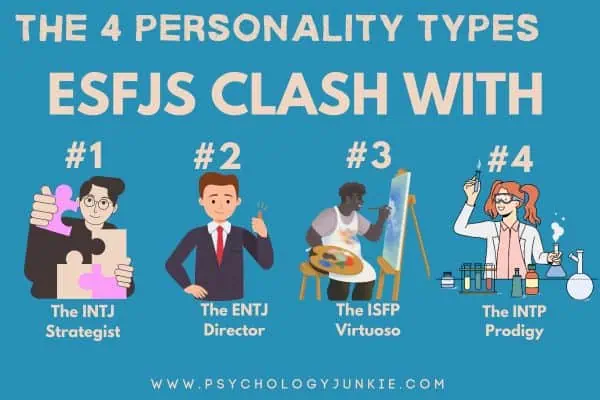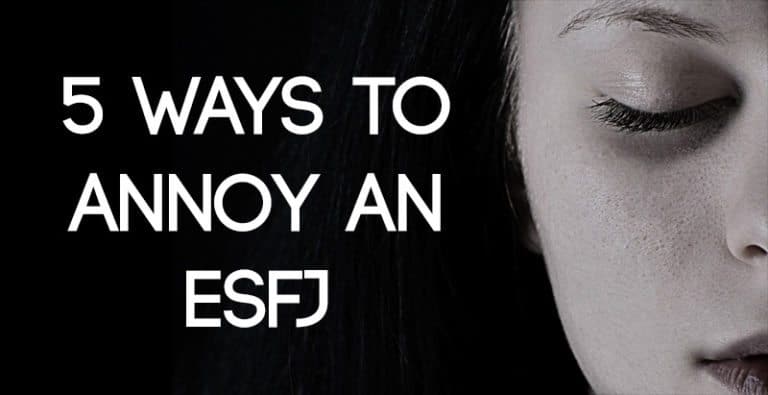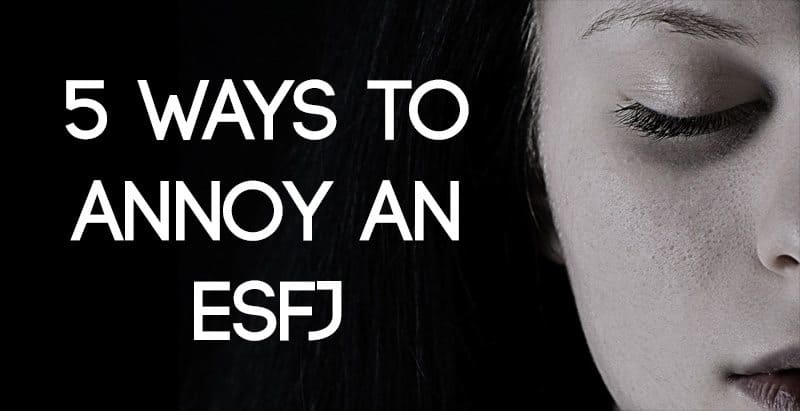The Four Personality Types ESFJs Clash with Most (and How to Connect)
Today, we’re diving into ESFJs and the personality types they tend to clash with most. Why does this matter? Well, it’s not about saying one type is “better” than another (spoiler: they’re not). It’s about understanding why some people just seem to rub us the wrong way—and why we sometimes drive them nuts, too.
A lot of clashes come down to communication styles, priorities, and blind spots. We all see the world through a certain lens, and when someone else’s lens is wildly different, it’s easy to think, “They’re doing life wrong.” But the truth is, they’re not—they’re just doing it differently.

So, let’s talk ESFJs. I call them “The Defenders” because they’re all about creating stability, nurturing relationships, and doing what they feel is right for everyone. They’re the ones making sure your family traditions happen every year, or that your group project doesn’t fall apart because no one else bothered to coordinate. They’re warm, responsible, and practical—but sometimes those very strengths can clash with certain personality types who just don’t value the same things.
So Who Do ESFJs Not Get Along With?
According to a survey of over 80,000 people, there are four types ESFJs tend to clash with most: INTJs, ENTJs, ISFPs, and INTPs. These clashes aren’t about bad blood—they’re about different ways of thinking, feeling, and approaching life. If you’re an ESFJ wondering why you and your INTP bestie keep butting heads, or an INTJ trying to figure out why your ESFJ coworker seems so extra, this article is here to help.
We’ll unpack why these clashes happen, share insights from real-life experiences, and—most importantly—figure out how these types can learn to connect and grow together. Let’s dive in!
Not sure what your personality type is? Take our personality questionnaire here. Or you can take the official MBTI® here.
These Are the Personality Types ESFJs Clash with Most

#1 INTJs – Why ESFJs and “The Strategists” Clash
INTJs are the planners, the visionaries, the “big picture” thinkers of the personality world. I call them “The Strategists” because they have a knack for envisioning a future outcome and working backwards to plot the best course of action. They’re logical, independent, and future-focused. To an ESFJ, though? They can feel distant, cold, and, honestly, a little judgy.
Here’s the thing: ESFJs are focused on relationships in the present. They’re practical, people-oriented, and expressive. INTJs, on the other hand, are constantly looking ahead. They’re more interested in abstract concepts, theories, and long-term goals than what’s happening right now. And….expressiveness? Not so much their forte.
To an ESFJ, this can feel like the INTJ is brushing off the things that matter most—people, connection, traditions.
One ESFJ client told me, “My INTJ coworker never participates in the office events. They just sit at their desk like nothing’s happening. When I ask him to join in, he just says something sarcastic in response. I get that he doesn’t want to do it, but he could at least be polite about it.”
Meanwhile, I repeatedly hear from INTJs how they despise parties, obligatory social gatherings, or small talk. You can see the disconnect, right? The ESFJ sees the INTJ’s behavior as cold and unkind. The INTJ sees the ESFJ’s priorities as frivolous.
And then there’s the communication difference. ESFJs are warm and expressive—they wear their emotions on their sleeve. INTJs? Not so much. They’re reserved, private, and often see emotional displays as unnecessary or even manipulative. To an ESFJ, this can feel like hitting a wall. To an INTJ, the ESFJ’s emotional energy can feel overwhelming or even exhausting.
How ESFJs and INTJs Can Connect
Despite these differences, ESFJs and INTJs can learn a lot from each other. ESFJs can help INTJs engage with the present moment and connect with people, while INTJs can show ESFJs the value of stepping back and looking at the bigger picture.
Here’s what works:
- For ESFJs: Don’t take the INTJ’s aloofness personally. They’re not trying to be rude—it’s just how they operate. A lot of their deeper feelings lie under the surface and are not obvious from the outside.
- For INTJs: Make an effort to engage with the ESFJ’s world. You don’t have to love small talk or social events but be polite and show gratitude for their efforts.
- For ESFJs: Give the INTJ space to think. They’re not avoiding you—they’re recharging.
- For INTJs: Show an interest in their routines and traditions. Ask the “why” behind them, and really listen. You might find interesting patterns or insights and they will feel heard and valued by your curiosity.
Here’s what’s key to remember:
NTJs and ESFJs don’t share any of the same cognitive functions in their primary stack. If you don’t know what cognitive functions are, that’s okay. It basically means that ESFJs and INTJs don’t process the world around them through the same lenses. And they don’t make decisions by weighing the same criteria. In many ways it can feel like they’re both speaking different languages when they’re together!
When an ESFJ uses Fe, an INTJ tends to be skeptical. Why? Because Fe is in the Trickster position for them, so they tend to see it as manipulative, cagey, and untrustworthy.
When an INTJ uses Ni, an ESFJ tends to be skeptical. Why? Because Ni is in the Trickster position for them, so they tend to see it as manipulative, odd, and untrustworthy.
You get the idea?
Every cognitive function that an INTJ has is in the ESFJ’s shadow, which means ESFJs can feel uneasy or uncertain when interacting in the INTJ world. In the same way, all of the ESFJ’s functions are in the INTJ’s shadow.
It will take more work for these two types to “get” each other and to respect each other’s worldview. But it is possible. In fact, one of the couples that I’ve worked with is an INTJ/ESFJ couple and, even though they’ve had some bumps in the road, they’ve been tremendously happy for over two decades.
When these two types learn to appreciate each other’s strengths, they can create a dynamic partnership. The ESFJ brings warmth and connection, while the INTJ offers vision and strategy. It’s not always an easy road, but when it works, it’s a powerful combination.
You Might Also Like: Secrets to Happiness for Each Personality Type
#2 ENTJs – Why ESFJs and “The Directors” Clash
ENTJs are bold, decisive, and action-oriented. I call them “The Directors” because they love taking charge, organizing big plans, and moving full speed ahead toward their goals. They’re the type who’ll show up to a meeting with a color-coded flowchart and a 12-step action plan—and expect everyone to jump on board immediately. For the harmony-loving, people-focused ESFJ, though, this can feel… a bit intense.
Here’s the main challenge: ENTJs are all about efficiency and results. They see a goal, create a plan, and execute it—simple, right? Not exactly. ESFJs, while they value results, prioritize people and relationships. They’ll slow down to make sure everyone feels included and that no one’s left behind. To an ENTJ, this might seem like unnecessary hand-holding. To an ESFJ, the ENTJ’s focus on results can feel cold, domineering, or even dismissive.
I had an ESFJ client once say, “My ENTJ boss is always charging ahead without checking in with anyone. They don’t even ask if we’re okay with the plan—they just expect us to follow like minions.” Meanwhile, an ENTJ told me, “If I have to stop and explain everything, we’ll never get anything done. I’m a manager for a reason. I’m not your therapist.” You can see where this might get tricky.
Another point of friction? The ESFJ’s emotional expressiveness versus the ENTJ’s more blunt, direct approach. ESFJs wear their feelings on their sleeve—they’re not afraid to show when they’re happy, upset, or overwhelmed. While they know how to put their feelings aside for an important task, they also need space to express how they feel authentically.
ENTJs, on the other hand, can come across as emotionally detached, preferring to focus on facts and strategies. To an ESFJ, this can feel like the ENTJ doesn’t care. To an ENTJ, the ESFJ’s emotional energy can seem overwhelming or even inefficient.
How ESFJs and ENTJs Can Connect
As different as they are, ENTJs and ESFJs can balance each other out well. I’ve known several ESFJ/ENTJ couples who have made it work, but there’s a steep learning curve to get through at the beginning of the relationship.
After all, ESFJs and ENTJs share none of the same cognitive functions. All of the ENTJ’s cognitive functions are in the ESFJ’s shadow, and vice versa. This means that they will often approach each other with a bit of skepticism, wariness, and even distrust. It takes more work for them to accept each other’s worldviews, but once they do, they’re capable of growing in profound ways. The fact that they are so different means that they can both help each other see things in perspectives they might never have considered otherwise. But respect needs to be there first.
Here’s what works:
- For ESFJs: Try to see the ENTJ’s intensity as passion, not insensitivity. They care—they just show it through creating strategies, providing insights, and making things happen.
- For ENTJs: Slow down and check in with the ESFJ. Even a quick, “How’s everyone feeling about this?” can make a big difference.
- For ESFJs: Be direct about your needs. If you’re feeling overwhelmed or left out, let the ENTJ know—they love directness and clarity; they despise passive aggressiveness.
- For ENTJs: Remember that ESFJs need connection and appreciation. Taking a moment to say “thank you” or acknowledge their feelings can mean a great deal.
ESFJs and ENTJs are both goal-oriented and extroverted. When they can combine their gifts (Strategy/Insight with Empathy/Pragmatism) they are capable of amazing feats. Sure, it takes effort, but when these two types work together, they’re unstoppable.
You might also enjoy: 3 Emotions You Hate Being Around, Based On Your Myers-Briggs Personality Type
#3 ISFPs – Why ESFJs and “The Virtuosos” Clash
ISFPs are creative, free-spirited, and fiercely independent. They tend to go with the flow, living in the moment and following their heart. Yet while they may seem easy-going and relaxed, they have a firm set of values they live by. On top of that, they hate being “boxed in” or labeled and crave freedom to live according to their own idea of right and wrong. They hate being told who to be, how to express themselves, or what they “should” do or believe.
For the structure-loving, harmony-seeking ESFJ, though, this can feel a little… frustrating.
Here’s the thing: ESFJs need routines, traditions, and clear expectations. They want to create a sense of stability and order, not just for themselves but for the people they care about. Yes, they want everyone to feel free, but they also want people to follow some general rules about friendliness, timeliness, and community support.
Making sure everyone feels seen, cared about, and supported is key. This is why ESFJs make some of the very best hosts and hostesses.
ISFPs? They’d rather keep things flexible, taking life as it comes. While they care about others, their focus is more introspective than outward-focused. This means that they aren’t as likely to notice how everyone’s feeling, and even if they do, they feel that everyone is the master of their own feelings. They’re more focused on quietly being present than trying to “manage” the emotional atmosphere.
To an ESFJ, the ISFP’s nature can feel unreliable or even self-centered. Meanwhile, ISFPs might see the ESFJ’s focus on structure and group harmony as controlling or even meddling.
One ESFJ client once told me, “My ISFP sibling is impossible to plan with. I try to get everyone together for a family dinner, and they show up late—or not at all—and act like it’s no big deal.” On the flip side, an ISFP shared, “My ESFJ mom is always telling me how I should behave or what I should say or NOT say in social situations. I’ve never felt more exhausted than when I’m at home.”
Another clash? Fi vs. Fe. ISFPs use Introverted Feeling (Fi) to make decisions based on their deeply held personal values. They don’t care much about what the group thinks—they care about staying true to themselves. ESFJs, on the other hand, use Extraverted Feeling (Fe) to prioritize group harmony and shared values. To an ESFJ, the ISFP’s focus on self-expression can seem self-absorbed or out of touch with the needs of others. To an ISFP, the ESFJ’s people-pleasing tendencies can feel phony or even manipulative.
Here’s an example: I have an ISFP child in my own home. At a recent Christmas event, an obviously shy child sat down next to my ISFP child, clearly wanting to form a friendship. I made some small talk to try to help the shy child feel comfortable. The ISFP just sat there humming to a song in her own head. When I asked her to talk to the other girl she just shrugged. She was fine with the girl sitting next to her, but didn’t feel any compulsion to “smooth out” the social situation and ask small-talk questions she didn’t actually care about. To an FJ type, this might seem rude. But to an ISFP, being forced to engage in small talk anytime someone sits next to you can feel ridiculous. Everyone’s responsible for their own emotional experience; can’t we just be quiet together? Why do we have to put on an “act”?
How ESFJs and ISFPs Can Connect
Despite their differences, ISFPs and ESFJs can empower each other and help each other grow. ISFPs can help ESFJs recognize their own individual values, desires, and needs. I’ve known so many ESFJs who benefited from IxFP friends who helped them look inwards and prioritize themselves instead of constantly taking care of everyone else.
In the same way, ESFJs can help ISFPs to see the impact they have on others, how their actions and voice matter, and can help them to harness their voice and share it with more people.
Here’s what works:
- For ESFJs: Respect the ISFP’s need for freedom. They’re not trying to be difficult—they just don’t operate well within a lot of constraints and strict schedules.
- For ISFPs: Appreciate the ESFJ’s effort to create harmony. They’re not trying to control you—they’re trying to make life easier for everyone.
- For ESFJs: Realize that when an ISFP doesn’t conform to every social nicety, it’s not that they’re being “mean.” For them, being caring is being genuine. It feels dishonest to them to say things they don’t care about or act in a way that feels inauthentic.
- For ISFPs: Show up for the ESFJ when it matters. They put a lot of effort into caring for others, and a little acknowledgment can mean the world to them. Say thank you, try to set alerts on your phone so that you can be at scheduled events on time. But be clear if you need a break or some space, too.
When these two types focus on understanding rather than judgment, their differences can become complementary. ISFPs bring creativity and flexibility, while ESFJs bring structure and connection. Together, they can create something truly special—if they’re willing to meet in the middle.
Another article you might enjoy: Here’s the World-Changing Historical Figure with Your Personality Type
#4 INTPs – Why ESFJs and “The Prodigies” Clash
INTPs are the ultimate idea people. They love to analyze, theorize, and dive deep into abstract concepts. They’re curious, independent, and always asking, “What if?” But for the pragmatic, people-focused ESFJ, this can feel… confusing. Or maddening. Or both.
The biggest source of friction between these two types? Their priorities are practically polar opposites. ESFJs prize connection, harmony, and shared values. They want to know what’s going on with everyone, what they need, and how they’re feeling. They are masters of interpersonal connection and rapport. Laughing, sharing stories, and having heart-to-heart conversations are their forte. They’re all about bringing people together, creating memorable traditions, and making sure everyone’s on the same page.
INTPs, on the other hand, couldn’t care less about social norms or group dynamics. They’re happiest in their own mental playground, chasing ideas and solving puzzles. To an ESFJ, this can feel like the INTP is aloof or even indifferent. To an INTP, the ESFJ’s traditional, people-oriented nature can seem overwhelming—or worse, like unnecessary interference.
One ESFJ I worked with described their INTP sibling this way: “He’s always questioning everything, even the simplest things. I’ll say, ‘Let’s have dinner at 6,’ and he’ll ask, ‘Why 6? Why not 6:30?’ It’s exhausting!” Meanwhile, the INTP disagreed. “I don’t ask irrelevant questions like that. I question things, yes, but not pointless BS. I’ll question why you’re religious, why you put on an act for other people.”
As you can imagine, things got more and more heated during the conversation, with both types getting defensive and irritable. But over time as the types learned more about each other, they learned to give each other some grace, space, and understanding that was sorely needed. The ESFJ learned to give the INTP a bit more flexibility and stopped seeing their skeptical nature as an attack (most of the time). The INTP learned to respect the ESFJ’s gregarious nature without seeing it as “fake” or “too much.”
And then there’s the communication gap. ESFJs tend to speak in terms of relationships and shared experiences. INTPs? They’re all about logic, theories, and dissecting ideas. An ESFJ might tell a heartfelt story about their day, expecting warmth or empathy in return, only to hear the INTP respond with, “That doesn’t seem statistically likely.” To the INTP, this feels like engaging in an interesting conversation. To the ESFJ, it feels like being dismissed.
How ESFJs and INTPs Can Connect
Yes, these two types are wildly different, but when they take the time to understand each other, they can help each other to be more balanced. In fact, I’ve known more ESFJ and INTP couples than any other relationship combo.
Why? Because INTPs know they need more connection, warmth, and emotional support. Fe (the ESFJ’s dominant function) is the INTP’s inferior function. Some people call this their “aspiring” function. In order to be healthy, INTPs need to integrate Fe into their lives. Being with an ESFJ automatically helps that to happen. Even if they might seem aloof or detached, they often enjoy how warm, accommodating, and supportive ESFJs are. They just may not know how to return the favor.
In the same way, ESFJs have inferior Ti (Introverted Thinking). They want more clarity in their thinking, less confusion in troubleshooting, and a more analytical approach rather than always being swept up in what people need or want. However, that is easier said than done. Being with an INTP helps ESFJs to gain more clarity in understanding how things work, and the INTP also encourages them to speak their truth and prioritize themselves, even when it might rub others the wrong way. Together they can be each other’s most supportive teammates and partners in life. They just need to give each other some space, respect, and understanding.
Here’s what works:
- For ESFJs: Give the INTP space to think and process. They’re not ignoring you—they just need time to figure things out.
- For INTPs: Make an effort to engage with the ESFJ’s world. Show interest in their stories or feelings, even if it doesn’t come naturally.
- For ESFJs: Don’t take the INTP’s lack of emotional expressiveness personally. They care—they just show it differently.
- For INTPs: Be mindful of how you phrase things. A little warmth or encouragement can go a long way with an ESFJ.
When these two types focus on their strengths, they can create a partnership that’s both intellectually stimulating and emotionally supportive. INTPs bring curiosity and innovation, while ESFJs bring connection and care. It might not always be an easy road, but when these two types work together, they can create something truly meaningful.
You might also like: 10 Things ESFJs Need in a Relationship
What Do You Think?
Have you ever been in one of these relationship pairings? Do you have any words of wisdom or insights to share? Let us and other readers know in the comments! We’d love to hear from you!











